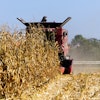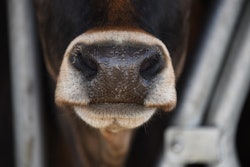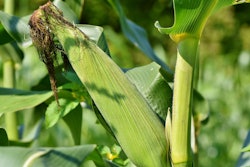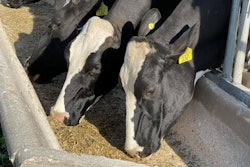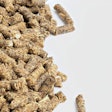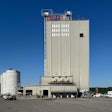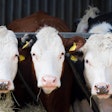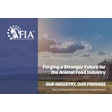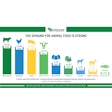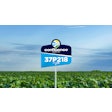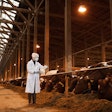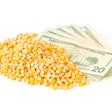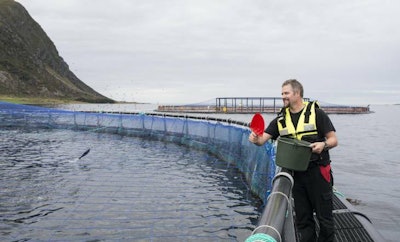
Unsustainable and irresponsible practices across the aquaculture feed supply chain risk undoing the positive impact of the farming industry according to the Aquaculture Stewardship Council (ASC) which is launching a Feed Standard to tackle this issue.
The standard is the result of years of development by a diverse group of experts comprising feed producers, retailers, NGOs, farmers, and other stakeholders.
It requires that feed mills meet strict environmental and social requirements; source ingredients from socially responsible suppliers; and use environmentally responsible raw materials.
In doing so, issues in both the supply chain and at raw material level are addressed. Requirements on reporting of performance will also improve the transparency of the industry, reward environmental sustainability, and assist future research into responsible feed.
The standard will now enter a 14-month ‘effective period’, allowing auditors, feed manufacturers and their suppliers to familiarize themselves with the standard and prepare for certification.
Following that period, the standard will become effective in Fall 2022, when feed mills become eligible for certification. Farms will then have 24 months to switch to ASC compliant feed in order to continue meeting the ASC Farm Standards.
Following the Netflix film Seaspiracy, there has been much debate about the impact of the marine ingredients used by fish farms. ASC’s Feed Standard makes clear that while certified mills must source increasing levels of environmentally sustainable ingredients, marine ingredients in fact make up a minority of feed ingredients, with around 75% of global aquafeed ingredients derived from agriculture – crops like soy, wheat and rice. These have their own impacts, notably deforestation and land conversion, which are often overlooked in debates about the industry.
“Aquaculture is already providing over half of the seafood consumed around the world, livelihoods to millions of people, and without it we will not be able to achieve food security for a growing global population with a low carbon footprint," says Chris Ninnes, ASC CEO. "But this positive impact will be undone unless the feed used by the industry is sourced responsibly. ASC has spent the last decade incentivizing producers to reduce the impacts of their farms, and now we’re spreading this approach to the wider supply chain.
“Marine ingredients play an important role providing vital nutrients to farmed fish, but like everything they must be used and sourced responsibly. Rather than driving substitution of one type of ingredient with another, the ASC Feed Standard recognizes that all ingredients – marine and agricultural – can have benefits as well as impacts, and must be addressed holistically.
“We know many producers and feed manufacturers are already taking this issue seriously, and we want to reward them and incentivize others to follow suit to tackle what could be the biggest threat to the industry’s reputation. This standard could not have been produced without the work and expertise of our multi-stakeholder Steering Committee and I’d like to thank them for their contribution to this important milestone for the wider industry.”
Extending ASC’s approach to responsible aquaculture
The Feed Standard takes the ASC’s approach to responsible aquaculture and extends it to the feed mills that manufacture aquafeed, as well as the suppliers of their ingredients. These mills will be the facilities audited against the standard, but they and farms will be given time to ensure their supply chains meet ASC requirements. The Standard will also incentivize more feed mills to work toward certification to meet growing demand from ASC farms.
As well as environmental sustainability, mills must also ensure they and their suppliers are socially responsible. For instance, independent auditors must verify that mills are not using forced or child labor, pay and treat their staff fairly, and must not discriminate on any grounds. They must also be responsible neighbors, communicating proactively with their local communities. Certified feed mills are required to conduct Due Diligence on their supply chains to adhere to these principles as well, ensuring an impact in areas where the risk of these issues are more prevalent.
As a source of protein, aquaculture has one of the lowest carbon footprints, but it is important that the industry monitors and works to reduce its footprint along the entire supply chain. ASC certified feed mills will have to record and report their energy use and greenhouse gas emissions; and work to improve energy efficiency, use of renewables, and water usage.
The Feed Standard uses an improvement model for marine ingredients which requires feed mills to source from more sustainable fisheries overtime. MSC and MarinTrust, both full ISEAL-members, play a crucial role in this mechanism and form the key stepping stones for improvement. Intermediate steps are recognized FIP programs leading-up to each scheme representatively.
The model offers a unique opportunity for feed mills to work together with their fish meal and fish oil suppliers to meet the increasing requirements over time. Ultimately, the major volume of marine ingredients needs to be derived from MSC fisheries.
For plant based ingredients, as with marine based, mills will have to record and report all ingredients that make up over 1% of a feed, and will need to take steps to ensure they have been responsibly sourced. Crucially, they will have to assess the risk of a particular ingredient contributing towards deforestation or land conversion, and must commit to transitioning to a supply chain free from these key negative impacts.
Next steps
ASC will be providing additional documents for auditors and feed mills to provide clear guidance on how the standard should be implemented, just as the Certification Accreditation Requirements (CAR) does for the ASC farm standards. ASC is also working with mills to ensure these documents are appropriate in a practical setting, and looking at ways to make the audit process as efficient as possible.
During the current period, alongside this guidance workshops will be held for stakeholders to learn more and ask questions. ASC staff across the world will be reaching out to their stakeholders in various sectors to explain the benefits and requirements of the new standard, and how they could be impacted.
To read the full standard and for more information see the Feed Standard page.
The Aquaculture Stewardship Council (ASC) is the world’s leading certification scheme for farmed seafood – known as aquaculture – and the ASC label only appears on food from farms that have been independently assessed and certified as being environmentally and socially responsible.

